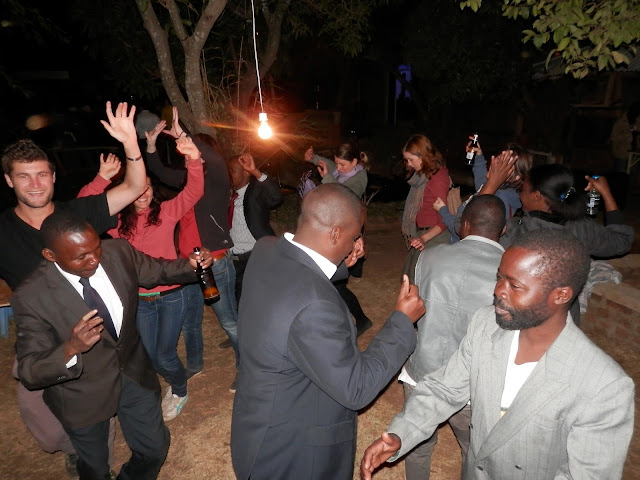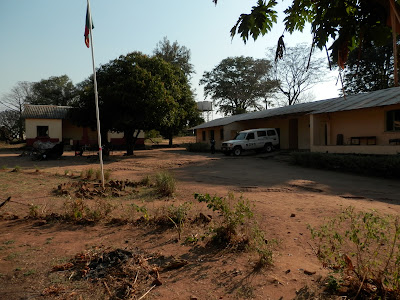As we seem to be in a blogging mood today, we thought we
should post an entry about our life at the hospital, as mostly it looks like we
are having a jolly fine holiday…
So I’ll start with a ‘typical’ day, and see where it goes…

After a fine breakfast of filter coffee and cornflakes (I
don’t think the English language can do justice to my increasing hatred of
soggy cornflakes), we head into the hospital at 8am. After passing through the entrance Becca heads right to St
Monica ward (ladies), and I turn left to St Augustine ward (gents). The ward round starts with the ITU
(Intensive Care) round. It is a
little different from our previous intensive care experiences, but the patients
do have the luxury of an oxygen concentrating machine (2 per ward, 2-4L oxygen
per patient) and slightly closer observations. The intensive care patients range from those with
meningitis, severe pneumonias, strokes, poisoning (the favourites here are
methanol, organophosphates and battery acid). This usually takes the best part of an hour before we move
to the rest of the ward to see the remaining, hopefully not quite so sick, 30
or so patients. Our Nyanja
language skills are improving, I can ask people if they have been vomiting, coughing,
or had diarrhoea or fevers; although thankfully (for the patients) we are
usually accompanied by a nurse to translate. We have patients with quite a range of medical conditions,
although there is a lot of TB and HIV-related complications (opportunistic
infections as well as drug side effects), other infections like malaria and
diarrhoeal diseases, we also have a lot of patients with heart failure,
diabetes, asthma and the usual fare!
Patients care is mostly provided by relatives, known as ‘bedsiders’ who
stay with the patients 24 hours a day – not something you’d see in the UK!
The ward round hopefully finishes, or is interrupted, at
11am for a cup of tea and a freshly-baked roll, before we head to outpatients
to get started on the long queue of people. People arrive to queue from about 5am (I am told) and whilst
usually very patient and uncomplaining, the stress of the queue can
occasionally lead to physical fights breaking out. Due to a shortage of translators, 4-6 doctors consult in one
room with 1 or 2 translators who seem to not only help with the language, but
also throw in the odd comment and keep everyone in check. In clinic we see everything from
‘stretcher cases’ (meaning you’re too unwell to walk) to people with chronic
diseases to the worried well. We
break for lunch at one for an hour, much to the annoyance of the queue, and
then head back for a full afternoon of clinic. Consulting in a room with several other consultations is not
great for confidentiality, but certainly provides regular moments of hilarity
(Becca got patted on the head by an elderly lady last week, and sending someone
behind the curtain to be examined not infrequently results in them taking all
their clothes off..)
Clinic finishes at around 5 and then it’s back to the ward
to review the new admissions and do the evening ward round of ITU, hopefully in
time for dinner at 6.30. When
there’s a possibility of goat I am usually quite good at leaving the hospital
promptly. About once a week, and
every few weekends we have on-calls, covering medicine, paediatrics and
neonates overnight. Becca is now
very familiar with paeds, having done several weekends there, and I do not seem
to be able to do a night on-call without 2 or 3 calls to SCBU (Special Care
Baby Unit).
Having got to the half way stage of our stay, we have both
really enjoyed working at this very welcoming, friendly hospital. Although we have our frustrations with
essential drugs (such as insulin) going out of stock from time to time, as well
as lab machines breaking down (the full blood count machine has been awaiting an
engineer for about 2 months), it has been a great time. The patients are really good fun – you never
know what could be coming in next, and it is really exciting to be here at a
time when so many people are now living with HIV as a chronic disease, rather
than a terminal diagnosis, and be part of an organisation that is providing a
really excellent service free-of-charge to the local community.




































































